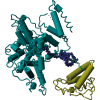Scientists have demonstrated a new, RNA-based vaccine strategy that is effective against any strain of a virus and can be used safely even by babies and the immunocompromised.

This new strategy would eliminate the need to create all these different shots to target subvariants, because it targets a part of the viral genome that is common to all strains of a virus. The vaccine, how it works, and a demonstration of its efficacy in mice is described in a paper published in the Proceedings of the National Academy of Sciences.
“What I want to emphasise about this vaccine strategy is that it is broad,” said University of California - Riverside (UCR)Virologist and paper author Rong Hai.
“It is broadly applicable to any number of viruses, broadly effective against any variant of a virus, and safe for a broad spectrum of people. This could be the universal vaccine that we have been looking for.”
The new vaccine uses a live, modified version of a virus. However, it does not rely on the vaccinated body having this traditional immune response or immune active proteins – this is the reason it can be used by babies whose immune systems are underdeveloped, or people suffering from a disease that overtaxes their immune system.
“A host – a person, a mouse, anyone infected – will produce small interfering RNAs as an immune response to viral infection. These then knock down the virus,” said Shouwei Ding, Distinguished Professor of Microbiology at UCR, and lead paper author.
The researchers believe they can “cut and paste” this strategy to make a one-and-done vaccine for any number of viruses.
Image credit | iStock




